"All residents of the city have my number". Nikopol mayor about openness of authorities, shelling, Zaporizhzhia NPP and industrial future
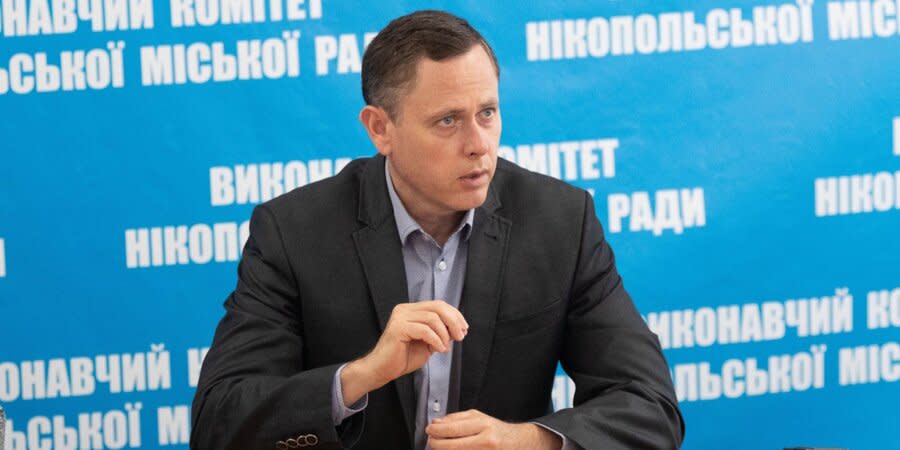
"You need to be issued a press card by the Ministry of Defense and be accredited by the regional military administration to get approval to go to the checkpoint and be allowed to meet with the mayor," explained Oksana Sokolovska, the mayor's adviser on publicity, accountability, and corruption prevention.
NV began preparing these documents at the end of December. The formalities were completed at the beginning of February, allowing NV to make our way to Nikopol, which has been cooperating with the "Cities of Integrity" program of the EU Anti-Corruption Initiative in Ukraine (EUACI) since 2018.
Nikopol is a city of steelworkers, and it has most of its budget filled by its ironworks plant and several pipe-building enterprises which make up the Nikopol Southern Pipe Plant. Their area here is traditionally called the "pipe site".
We first headed to Dnipro by train. Along with the mayor's adviser, we left for the Dnipro railway station by car.
After just 1.5 hours on the road, which was repaired only two years ago, we are standing on the square in front of the Nikopol City Council. The clock reads 9:00 am. The bright sun is shining, but the piercing wind from the river intensifies the frosty chill that has settled all over Ukraine. After coming from the capital and the Dnipro, Nikopol is unusually deserted - there are practically no cars and pedestrians. Instead, on almost every street, there are municipal workers in bright vests who sweep the sidewalks and clean up garbage.
"It's even cleaner here than in the Dnipro," Sokolovska reflects, while we wait for the mayor.
At this time, he is holding his usual morning meeting, which was moved to an earlier time for the sake of our interview. Our casual conversation is interrupted by the announcement that Mayor Oleksandr Sayuk is ready to speak to us about the life of the city, its military and non-military risks, and the situation with displaced persons and humanitarian aid. At the last moment, Sayuk makes sure: "The OVA has definitely given accreditation to this journalist?.”
We understand that this is not a formality, but a matter of vital importance. His assistants respond affirmatively, and we begin the interview.

Plans and reality - 2022
- What was 2022 like for the city? What plans were implemented, and what had to be abandoned or postponed?
- At the end of 2021, we approved the city budget and approved all programs, including the Nikopol development program. It provided for the repair and construction of parks, road repairs, and much more. In January-February, tenders were held and contracts were prepared. A swimming pool, which was built from scratch, was supposed to be opened at the beginning of March. But on February 24, all was put on a long pause.
- Was this just because of the war factor?
- No. Budget legislation has changed in the country. The Cabinet of Ministers adopted amendments to Resolution No. 590, which clearly regulates the types of payments that can go through the treasury. Financing of capital and even current works was stopped.
In addition, as the war began, many people left the city. Some enterprises, even large ones, have closed. In the first months, the pipe yard worked at 50 percent capacity. Only the ironworks plant was working at 100 percent.
All this led to a reduction in revenues to the city budget. Therefore, for the first three months, we accumulated money to ensure the vital activities of the city and local self-government.
- How exactly did you act?
- We fundamentally decided not to reduce the number of teachers and kindergarten educators that continue receiving a salary. The salary of the teachers comes from the state subsidy, but we pay part of it. And the educators are fully funded by the city. The entire structure of communal enterprises and organizations was preserved without layoffs.
Because if the executive committee does not work, communal enterprises don't work, and the city stops.
- And how many people are in this structure?
- According to the city executive committee, we have a staff list of 258 people. There are a total of 5,600 workers in the municipality's employ.
- You had a revenue failure, so...
- We have been looking at our income for several months. It was important to understand whether there would be enough funds for protected articles by the end of the year.
- Was it enough?
- It was enough. We ended the year better than we had expected. The plan was underachieved by literally just 3-5%. What we lost in enterprises, in land, in renting communal property, was compensated for by taxing the salaries of soldiers.
Today we even have an available balance, a full reserve fund. Everything that was saved in 2022 was transferred to 2023. We are not planning any capital works while the shelling of the city continues. Today, the task is to ensure the operation of critical infrastructure, public utilities, and communally-owned institutions.
If victory comes quickly, if they [the Russian military – ed.] are removed from Enerhodar and the shelling stops, then we will rebuild our destroyed institutions and buildings. We have money for planning and to start this work. But, of course, we are relying on support from the state. Almost 2,500 buildings of various forms of ownership have been destroyed. It is simply impossible to restore such an amount with only the city's funds.
- How independent are you as a municipality in making decisions? Do you have to agree on your actions with the military administration?
- The military administration is created when there is no possibility for the civilian administration to work. But we have councilmembers, and legislative sessions are being held, the mayor is in place - everything is working.
There are issues on which we seek agreement with the regional military administration, but they are determined either by treasury regulations or budget legislation.
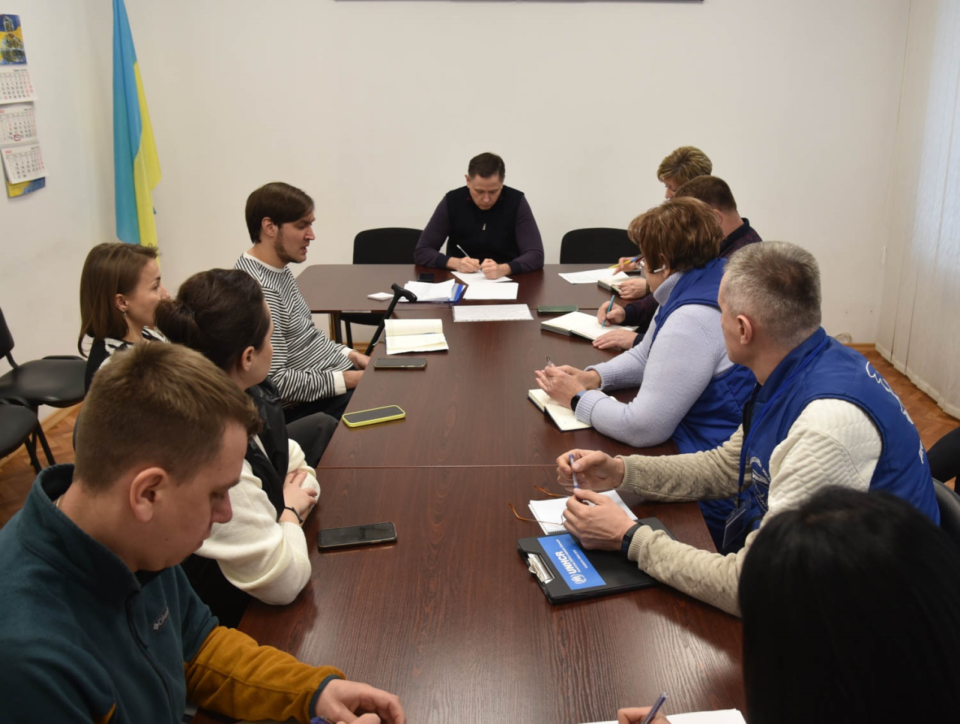
Evacuation of residents and the impact of the nuclear power plant
The historical district of Nikopol is located near the river. There are low-rise buildings, century-old mansions, and a marina for boats, yachts, and vessels. In one old photo, in the shadow of the city's executive committee building, you can see a shuttle station from the beginning of the 20th century. Even then, the people from Nikopol used this area for recreation.
Now, walks near the Dnipro are dangerous, but we have time for one after the interview. We use the opportunity to look out at the city. A boulevard leads to the embankment, at the beginning of which there is a monument to Bohdan Khmelnytskyi.
"Look, it's covered in debris," Oksana Sokolovska points out.
We approach the banks of the Dnipro.
"You won't be let any further by the Territorial Defense," the locals say, but I still manage to see through the light haze to one of the Zaporizhzhya nuclear power plant’s cooling towers, the largest in Europe. It is less than 10 kilometers away. The station has not been generating electricity for several months. It is completely under the control of the Russians, who are not concerned about the risks of a nuclear disaster.
It is dangerous to be in an open area, as there is regular shelling from the left bank: from Enerhodar, Vodyanyi, and Kamyanka-Dniprovska.
"They missed this building 5 or 6 times,” a resident explains.
We hurriedly leave the deserted area, where even grocery stores are closed. There are only a few people hanging around a single kiosk selling drinks and cigarettes. Nearby, two workers are replacing a broken slate on an old single-story building.
- When did people start leaving the city?
- The first wave began leaving after the shelling of the Zaporizhzhya nuclear power plant from March 3 to 4. A lot of people left, including municipal workers. We found a mechanism to provide a financial incentive to be here, and some employees returned.
- I was surprised. You drive into the city, and people are working, sweeping the streets.
- This is a principled position from before the war, and especially during the war - the city's residents must see that the government exists and is working. They should not live in a broken city. They should live in a civilized, Ukrainian city. Therefore, when we have attacks, the task is to immediately repair the damage - broken roads, broken windows, fallen trees, etc. If the military gives the go-ahead, the utility workers come out and restore order any day of the week.
- Did the shelling intensify after the occupation of Enerhodar?
- No. They did not fire on us for the first 5 months. But on July 12, shelling began almost daily. Then everything changed for the worse. Even more people left. There was a real shortage of utility workers. There was a shortage of construction crews. Therefore, through the city's utility company, we created teams that performed repair work.
The enemy shelled us 2-3 times a day. There was a large amount of work with the demolition of debris and garbage collection. Plus broken houses, broken roofs. More than 40 high-rise buildings have already been affected. To make it so that people were able to live there, we immediately repaired the roofs. It cost about UAH 35 million ($945,000).
But there are a few buildings that we haven't restored - they are heavily damaged. It’ll need experts, a project.
- How many people are left in the city?
- Before the war, Nikopol had about 106,000 inhabitants. When the war began, according to my subjective calculations, approximately 30,000 people left. And after the start of the active phase - another 30,000. According to very rough estimates, about 40% of the population has remained in the city.
In the last month, the intensity of shelling has slightly decreased. Today, there is a tendency for people to come back.
- How do people see the threat of a nuclear disaster in your city? Is this topic discussed among residents?
- Of course it is discussed. I think everyone who lives near a nuclear plant is always discussing this. Even in peacetime.
Everyone knows very well that there are Russian weapons and warehouses with ammunition at the nuclear power plant, and there are no considerations for the safe operation of the plant. Therefore, everyone is "in a platoon."
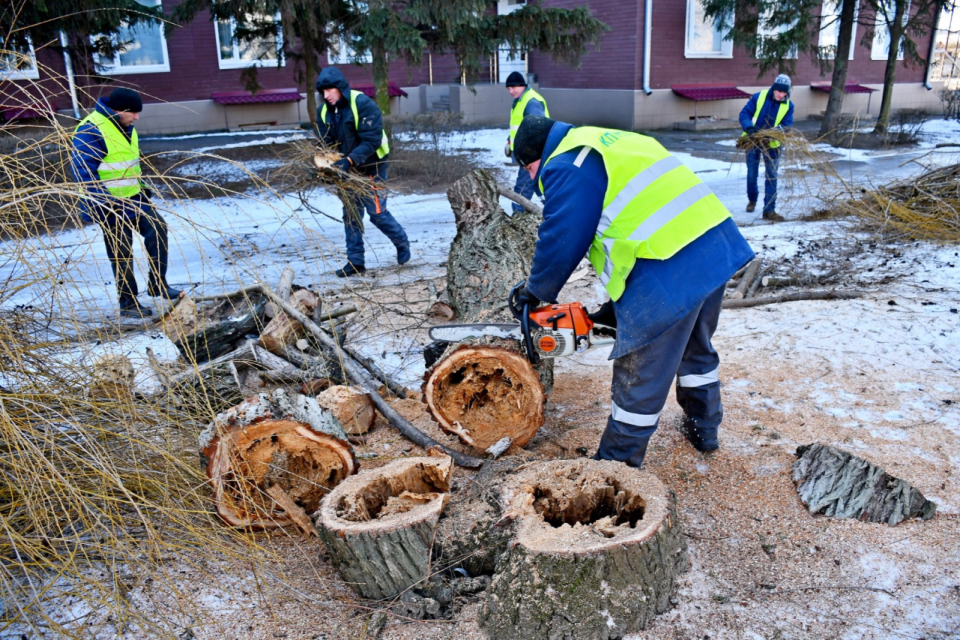
European programs and the mayor’s personal phone number
"At the end of 2017, the executive committee of the Nikopol City Council confirmed in writing the interest, readiness, desire, and ability of the City of Nikopol to cooperate with EUACI as a "City of Integrity," Sokolovska explains.
The memorandum of cooperation was signed on July 12, 2018. Completion of the program is planned for July 2024.
Several projects aimed at reducing the level of corruption using modern management tools have already been implemented. Six modules of Nikopol's geo-information system were developed and implemented, an assessment of corruption risks was carried out, an Integrity Plan for the city was approved, and an audit of the Nikopolvodokanal communal water utility was carried out. The development and implementation of an electronic reception room is underway, for which computer equipment was purchased using EUACI funds.
- How important were anti-corruption instruments before the war, and are they still relevant?
- You definitely can't talk about it in the past tense. This is a process that is going on now and will continue for a long time. Any fight against corruption, any openness of government is very good. We have to come to the point of making the government completely transparent.
Since 2021, we have been openly showing all our actions. All of our programs are available. Our electronic services are freely available.
- How positively does the local community see this openness?
- All residents of Nikopol have my phone number. They can call me, and I will answer and listen. I am in favor of everything being open. Then there are fewer questions and unclear moments.
I will not say that everything is good and perfect. There are managers who do not do their jobs very well, who live in the old way. In the past two years I’ve fired three heads of utility companies. Cases concerning two of the managers have been transferred to law enforcement agencies.
- Can you provide a specific example of these changes?
- With the help of Deloitte, we conducted an audit of the water utility, which was financed by EUACI. It turned out to be a very interesting and voluminous report. We clearly saw where everything is good, where we need to improve, and what to change. Plus, with the help of Deloitte, we are already planning the reconstruction of this enterprise, it has remained practically unchanged in the 60 years of its existence.
Another example: In 2021, with a smaller development budget, we managed to repair more roads and sidewalks than the year before. These are not just the results of complex analysis – even the residents have noticed positive changes.
New partners and humanitarian aid
After the interview, we drink coffee in the office of Serhii Doroshenko, head of the international cooperation and development department of the Nikopol City Executive Committee. He shares the latest news: "The other day, a proposal to establish a sister city relationship came from a German city. We are preparing documents."
New partners are important for this city, where the situation has changed sharply several times in 2022.
"At first, the Russians advanced very quickly in our direction,” recalls one one city official.
“But after a bridge was blown up 40 km from the city, they stopped.”
The city even began to accept displaced people from neighboring villages and distant regions. Moreover, sites have been prepared here for the relocation of enterprises from the east and south of Ukraine. But the Russians gained a foothold in Enerhodar and began regularly shelling the right bank of the Dnipro. Therefore, the development and transformation of Nikopol's economy became a matter for a future peacetime, not the wartime present. And more than half of the city's residents became IDPs.
- What complications, apart from direct military actions, can you highlight?
- With the beginning of the war, immigrants came to us. We had up to 6,000 IDPs. Most of them were taken in by city residents under the Shelter (Prikhistok) program. The municipality also had three facilities in which we settled them. All those who wanted it received accommodation.
Since April, we started working with international organizations to provide humanitarian aid in the form of groceries and such.
- Was this process somehow coordinated by the city executive committee?
- We have a working group which coordinated the work of volunteers and humanitarian organizations, because there are organizations that work only with a specific volunteer. People received [assistance] from them and would go to another point, and then receive it again. Some received 3-4 bags of food, while some did not have enough.
We have created a single system into which data is entered. If a person has already received [aid] this month, it can be seen at all points of issue. There are volunteers who work independently. We cannot force them to join this system. But for the most part order is maintained.
- Is this some kind of online database?
- So we record everything electronically. The city authorities, together with the SpivDia volunteer platform and with the assistance of the Nikopol District Military Administration, created 9 humanitarian aid distribution points.
Now we distribute up to 8,000 food kits per month. We plan to increase it to 30,000, because it is not only the displaced who are in real need, but also people from Nikopol.
- What other needs have there been?
- With the beginning of shelling, a problem arose with construction materials. We weren't quite ready for this turn of events, so we didn't stock up. We even had to borrow slate and OSB to board up windows. We were greatly helped by the Prolisok humanitarian foundation, which provided kits with awnings for roofs, boards, and plywood. It was difficult for a month or two, then they worked out a mechanism. Now we have supplies and we given free slate, OSB, and plastic covers after the raids.
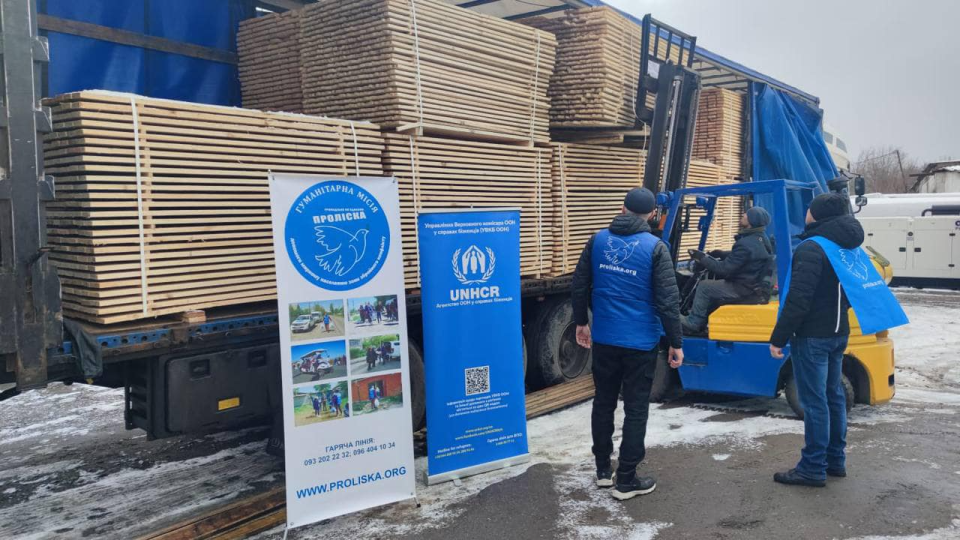
- At first you accepted IDPs yourself, and then many more Nikopol citizens became IDPs themselves. Are you helping them?
- If people go to another city, they are registered there and are considered IDPs there. According to the law, each city manager must provide for the displaced people who are registered in his city. We do this in our city, but, unfortunately, we cannot help those who have left.
But we communicate with the people from Nikopol and they share their experiences. Some cities provide everything they need, like we do. And some say: "Go back where you came from and get humanitarian aid." I called these cities and explained that they are obliged to provide humanitarian aid.
- How do you organize your work with donors? Do they help with humanitarian aid, and how does your focus on transparency help with that?
- We work with 4-5 funds to get groceries and building materials. When [donors] start providing aid, they observe how the recipients use it. If we distribute [this aid] with oversight, with signatures on reports, then this is transparent work. They see that everything is going well, and they increase their aid.
- Perhaps you have some unfilled needs?
- Today it's grocery packages. We have a stock of building materials and funds that help.
- Are there new opportunities for international cooperation?
- We work with international funds. We have a sister city in Lloydminster, Canada. And at a recent session, the city council approved the decision to become a sister city of Kolling in Denmark. Negotiations on the prospects of partnership are now underway.
There are examples of Nikopol residents living in other countries and transferring aid. We recently received a batch of generators from Spain.
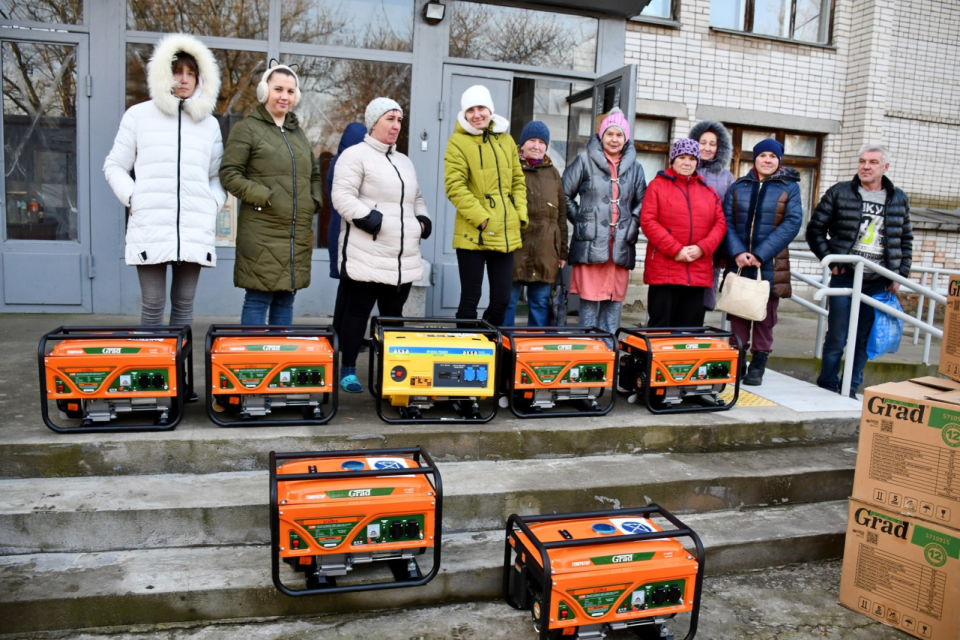
- Have you had to somehow stimulate local businesses to continue their operations?
- If an enterprise is operating, it earns income and pays taxes and other payments. It is very good that almost all the large enterprises have continued their operations. Yes, they have reduced their staff numbers, but they pay for both land and rent.
In terms of state-run businesses, payments for the lease of land and real estate were met. We may also waive or reduce utility rental fees. Frankly, I will say that we try to meet in the middle with those who, as volunteers, help displaced persons and military personnel. We completely or partially waive their rent payments. These issues are considered almost every month at city council sessions.
- I understand that this may not be a very topical question, but what were your plans to develop the city's investment attractiveness before the war, and do you maintain them?
- We have a program for that. We created an electronic ledger for the city, showing how much available land there was, which enterprises were operating, and what possibilities there were for accommodation. This is a geo-information system that was created, in particular, with the support of the EU Anti-Corruption Initiative in Ukraine.
Until 2020, the allocation of land in Nikopol was always a difficult issue - it was simply not allocated. Even after the auction norm (a change in legislation which allowed for the sale of land - ed.) was introduced, not a single auction was held for 7-8 years. It was possible to arrange sales either where real estate is already located, or with under-the-table dealing. But in a situation where there was a piece of land and I wanted to acquire it and do business – this was impossible.
- What was the reason?
- It was simply the reluctance of the previous government, a lack of political will.
We developed a mechanism and have been conducting auctions since 2021. All those interested were allowed to rent a plot of land, and the city received additional payments to its budget. 6 auctions were held for 2.7415 ha. The sale raised UAH 708,710 ($19,000).
Similarly, we have also started the sale of communal property through the Prozorro.Sales electronic platform.
But from 2022, everything is on hold, since Nikopol is in the active combat zone. Therefore, all registers are closed.
- How do you see Nikopol in the future? Is it possible to transform the urban economy?
- The first thing we will deal with is the restoration of everything that was destroyed.
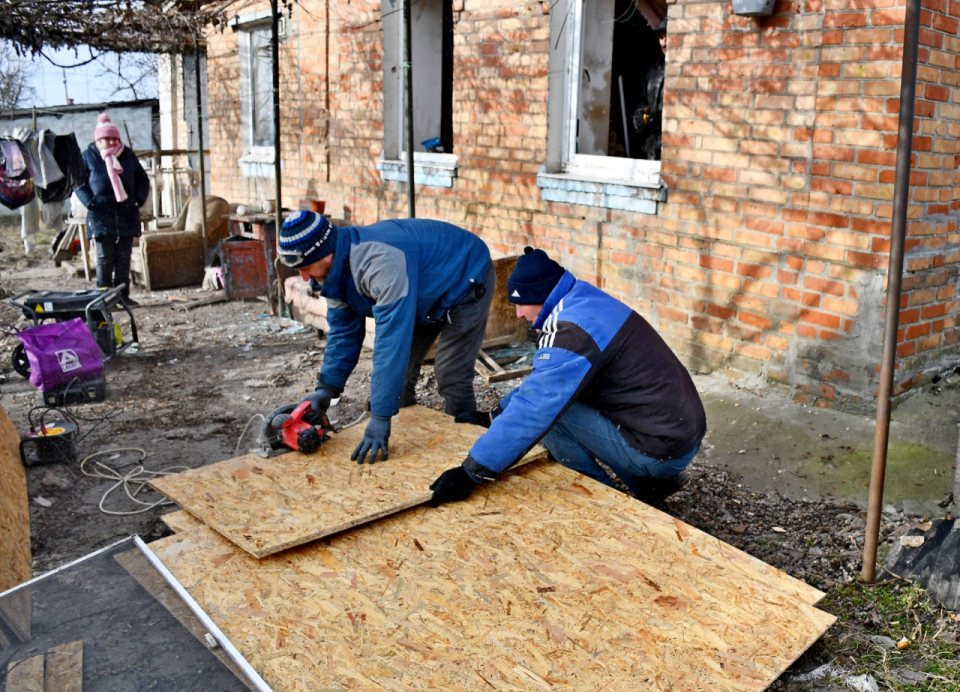
We are working on the creation of an industrial park. We support any business wanting to come here.
But we have two large industrial sites – the ironworks plant and pipe-building factory, which contain almost 10 different enterprises. They provide the main part of revenues to the budget, and also help repair damage from shelling. Therefore, we were and will remain an industrial city.
Nikopol is separated from the front line by the mighty Dnipro river and the Kakhovka Reservoir. But its neighborhoods are subjected to regular shelling. And the quantity of humanitarian issues is growing. For example, problems with drinking water are becoming more and more serious. After all, due to the partial destruction of the dam of the Kakhovka hydroelectric power plant, the level of the reservoir is dropping, and in some villages of Nikopol district, water intake is no longer possible. This issue is being handled by local authorities.
On the way out of Nikopol, we pass by a gas station that burned down.
"This part of the city was attacked very often, especially in autumn,” one of our escorts explain.
"The Russians calmed down until they had they left the gas station.”
That is why the windows in almost all the houses around it are boarded up.
But life in the city continues. It has just shifted into a holding pattern – waiting for the end of the war.
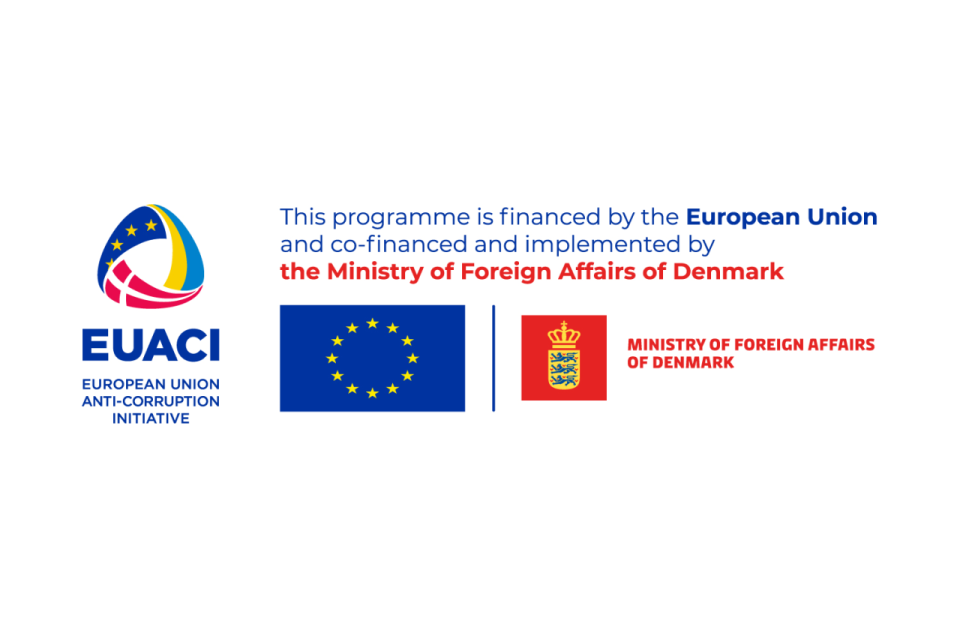
The project was created with the support of the EU Anti-Corruption Initiative in Ukraine (EUACI)
Read the original article on The New Voice of Ukraine

